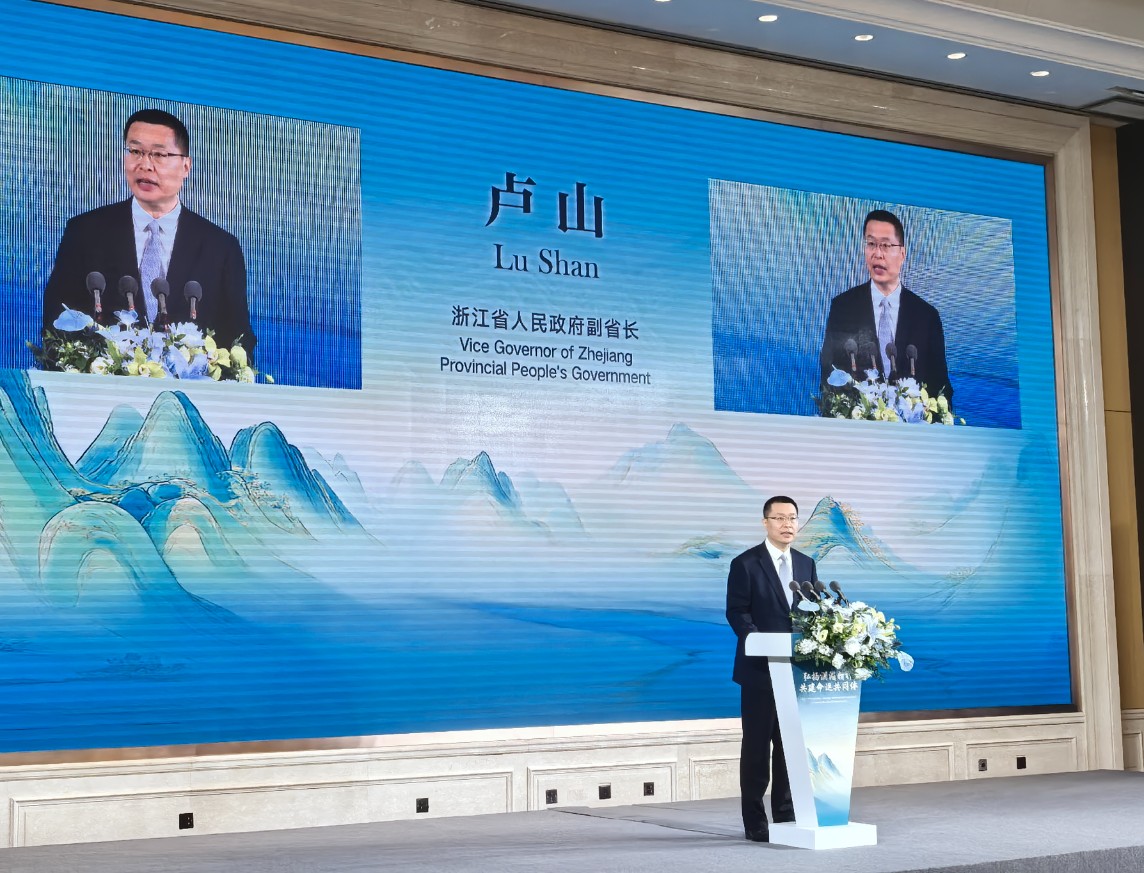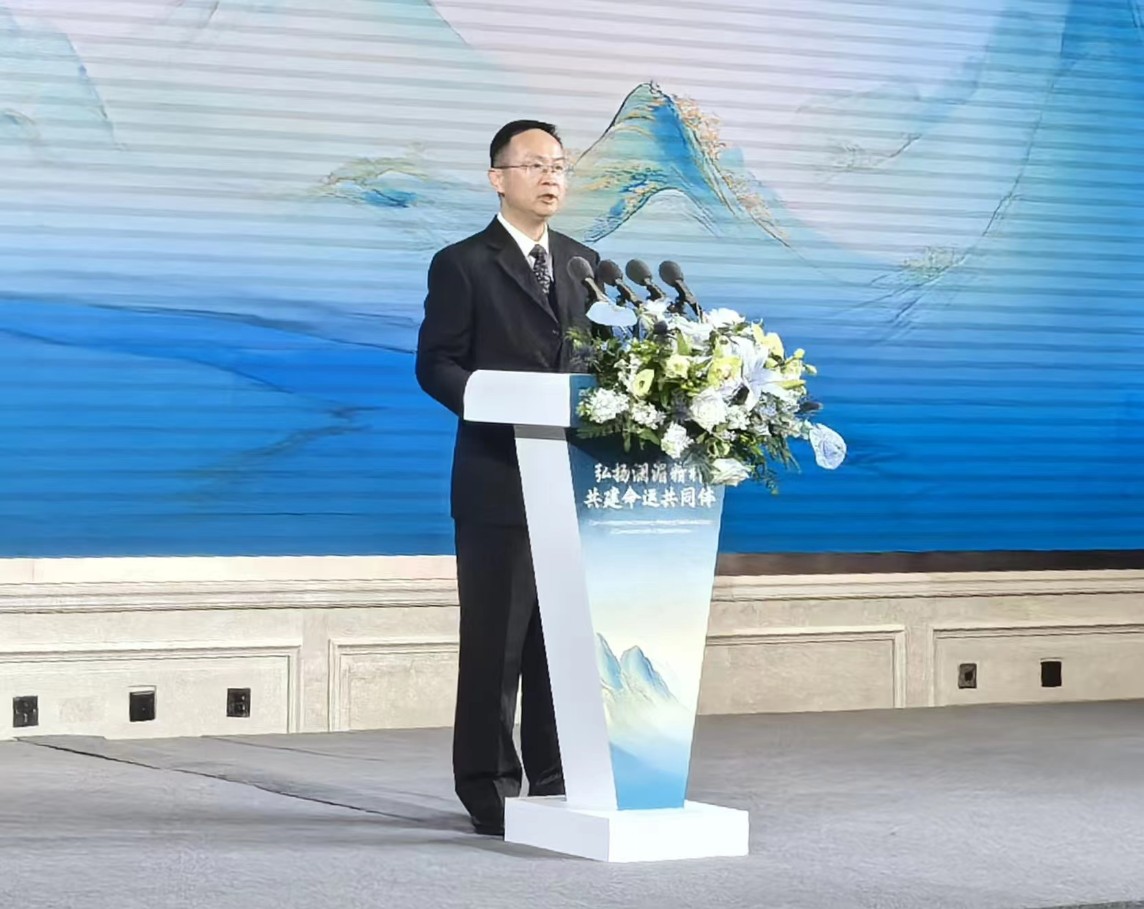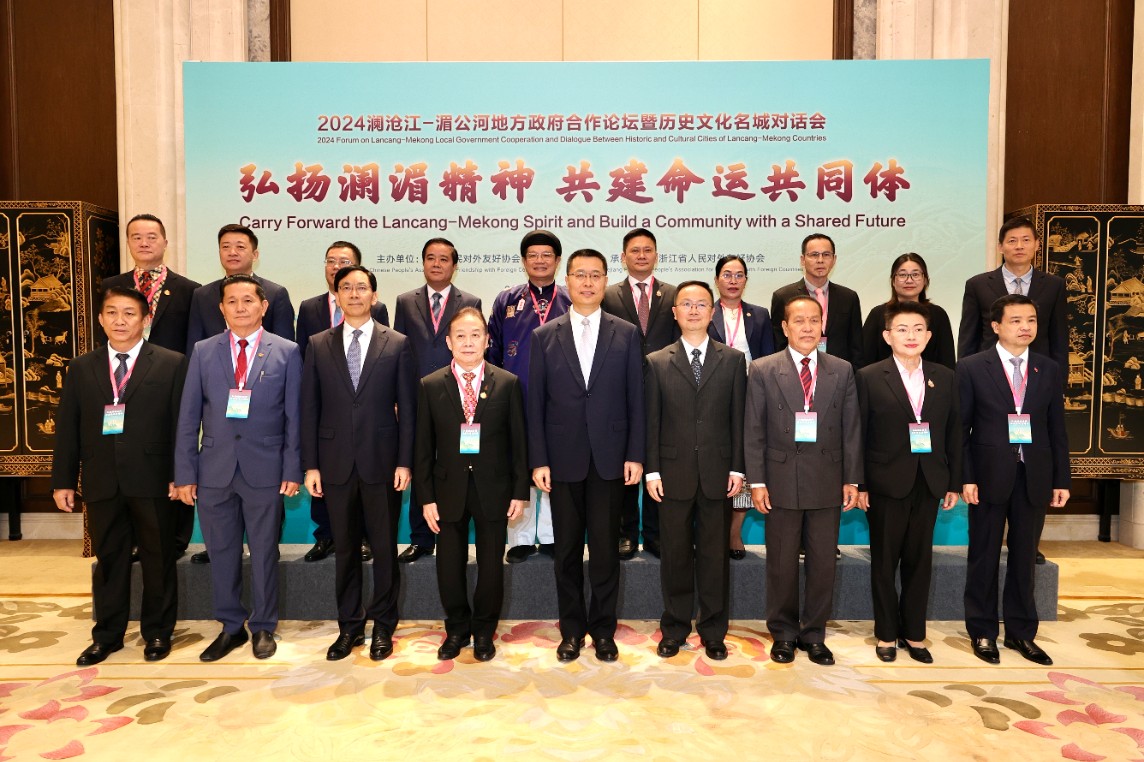On October 29, the 2024 Forum on Lancang-Mekong Local Government Cooperation and Dialogue Between Historic and Cultural Cities of Lancang-Mekong Countries was held in Hangzhou, the capital of Zhejiang Province. The event was hosted by the Chinese People's Association for Friendship with Foreign Countries (CPAFFC) and organized by the Zhejiang Provincial People's Association for Friendship with Foreign Countries. Approximately 160 attendees participated. On the Chinese side, attendees included Lu Shan, Vice Governor of Zhejiang Province; Sun Xueqing, Secretary-General of the CPAFFC; and heads of 33 local governments, foreign affairs offices and friendship associations. Also in attendance were M.R. Chirakom Kitiyakara, Honorary President of the Thai-Chinese Relations Association; Kim Pinun, Under Secretary of State, Ministry of Culture and Fine Arts of Cambodia; Ly Sary, Deputy Governor of Siem Reap Provincial Administration, Cambodia; Bounleum Manivong, Deputy Governor of Luang Prabang, Laos; Wantanee Wattana, Permanent Secretary for the Bangkok Metropolitan Administration, Thailand; Be Thanh Tinh, Member of the Standing Committee of the Cao Bang Provincial Committee and Director of the Cao Bang Provincial Education Department of Vietnam, and other representatives of 18 local governments, cultural organizations and chambers of commerce of the Mekong countries.

Lu Shan, Vice Governor of Zhejiang Province, welcomed the participants and provided an overview of Zhejiang's comprehensive economic and social transformation, driven by the province's "Eight Advantages and Eight Measures" strategy. He highlighted the fruitful outcomes of Zhejiang's exchanges and cooperation with the five Mekong countries in areas such as trade, investment, education, science and technology, and cultural tourism. Lu expressed his hope to further deepen these collaborations, contributing to the building of a community with a shared future for mankind and advancing modernization efforts together.

Sun Xueqing, Secretary-General of the CPAFFC, noted that the six Lancang-Mekong countries are natural partners, eternal friendly neighbors, and all developing nations. Since the launch of the Lancang-Mekong Cooperation (LMC) mechanism, the six countries have upheld the Lancang-Mekong spirit, pursuing mutual benefit and common development while achieving significant outcomes in various fields. All six countries in the Lancang-Mekong region are advancing the building of a community with a shared future, on either a bilateral or a multilateral basis, writing a new chapter of friendship and people-to-people exchanges. Sun emphasized that 2024 marks the 10th anniversary of the LMC initiative, and the CPAFFC stands ready to work with all parties to implement the consensus of the Fourth LMC Leaders' Meeting and the Ninth LMC Foreign Ministers' Meeting. He called for further efforts to deepen strategic mutual trust, promote pragmatic cooperation, and strengthen public support to advance the building of a community with a shared future for Lancang-Mekong countries.
Kim Pinun remarked that the LMC serves as an important comprehensive sub-regional cooperation platform, facilitating exchanges and collaboration in economy, trade, culture, science and technology, education, and healthcare among the Lancang-Mekong countries. Looking ahead, he called for sustained efforts to strengthen mutual trust and deepen cooperation, ensuring greater benefits for the people in the region.
Wantanee Wattana praised the Lancang-Mekong region's rich history and diverse cultures, emphasizing the shared mission of carrying forward the Lancang-Mekong spirit, consolidate the foundation for cooperation, and jointly addressing challenges. She expressed Bangkok's commitment to deepening the LMC, which she believes will support regional prosperity and contribute to peace and stability both within the region and globally.

Under the theme of "Carry Forward the Lancang-Mekong Spirit and Build a Community with a Shared Future", 24 representatives from local governments from different countries held extensive and in-depth exchanges on a wide range of topics while taking in account their local development experiences, achievements of cooperation between sister cities and unique advantages and resources. The topics included "Building Consensus on Development and Drawing a Better Blueprint", "Leveraging Local Advantages and Promoting Practical Cooperation", and "Deepening Mutual Learning among Civilizations and Promoting People-to-People Exchanges". They also explored possibilities for pragmatic cooperation, made proposals on enriching cooperation among local governments in the Lancang-Mekong region and bolstering mutual learning among civilizations, and reached broad consensus.
Participants agreed that the Forum on Lancang-Mekong Local Government Cooperation and Dialogue Between Historic and Cultural Cities of Lancang-Mekong Countries has served as a valuable platform for the countries in the basin to enhance mutual trust, strengthen cooperation, build consensus and create a better future. They expressed their commitment to carrying forward the Lancang-Mekong spirit, fostering people-to-people exchanges, aligning development priorities, and advancing the vision of cooperation. These efforts aim to bring people of the Lancang-Mekong countries closer to each other and make new contributions to the peace, stability, development, and prosperity of the region.
As part of the Forum, international delegates from Mekong countries visited high-tech enterprises in Zhejiang to experience the new quality productive forces and the birthplace of the Two Mountains concept (lucid waters and lush mountains are invaluable assets) to gain a deeper understanding of Xi Jinping Thought on Ecological Civilization.


